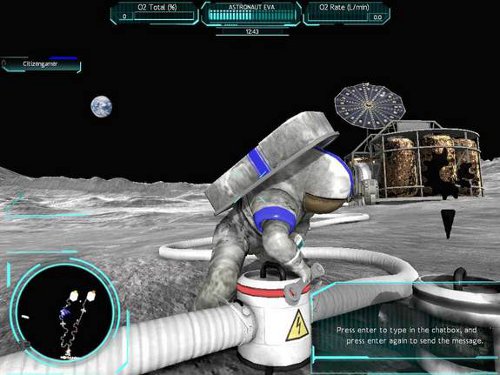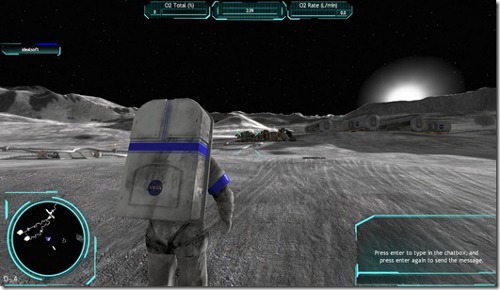home // text // multi-media // misc // info
video-games musings astronomy frustration NASA Fakes Moon Landing (in 2020)
So, I previously leveled some self-righteous nerd-rage criticism at Mass Effect for an unrealistic portrayal of Lunar geology and travel, pointing to NASA’s Moonbase Alpha as a counter-example in which scientific accuracy was actually conducive to compelling gameplay.
Honestly, if you haven’t played Moonbase Alpha yet: it’s free, it’s certainly unique, and some of you space geeks might actually get a kick out of it. And I’m actively looking for interested parties to play with. (You must at least watch the trailer: “THRILLS! Experience slow gameplay like never before! CHILLS! Attach things to other things! SPILLS! Use different types of tools on different types of things, I don’t know, regolith!”).
Now, once again, Moonbase Alpha didn’t, isn’t, and won’t make waves, but I happen to think it’s a great first foray by NASA into the realm of complex, mainstream gaming (there’s this I suppose, but, well, the demographic is slightly different and OH MY GOD that’s Comic Sans). The game emphasises teamwork, deliberation, and grace under pressure—very much suited to NASA’s scientific endeavour. But, frankly, I wouldn’t feel right if I didn’t turn das nerd-mikroscop right around and look at Moonbase Alpha in the same light as Mass Effect.
Briefly: there’s a lot that NASA did right. Note the loping gait in the video linked above, which surpasses Mass Effect‘s Earth-like sprinting by leaps and bounds (did I do what I see there?). And the relative scale of the Earth seems much more believable:

So far so good. I did have a smug little moment when I noticed that one could hear toolboxes opening and closing when not in direct contact—but it turns out that there’s a “Realistic Sounds” toggle that can be activated to eliminate sounds in space. I merely point out that it should be activated by default because really NASA, dorks like myself are your primary audience, and you know it.
Next, I was a bit disappointed at the complete lack of stars in the skydome—particularly puzzling since they should be relatively straightforward and cheap to render (cough). But again, a quick toggle flips the light switch (again begging the question as to why it isn’t switched on in the first place):

…Right. So, if you look closely, you can see the background stars. If you look not closely at all, you can see that the Sun is represented by a giant ball of What The Hell. There’s some serious atmospheric scattering going on there (looks like Mie scattering to me, though I’m obviously not an expert), when, in fact, not so much with the atmosphere:
From the size of the scatter, I’m fairly certain it would be possible to calculate the apparent thickness of the “Lunar atmosphere,” though that’s a bit out of scope at the moment.
It’s a trivial nit to pick, of course, and purely a background detail; I’m assuming it was a result of time or budget constraints (though is it really that hard to render a yellowish disc as opposed to a bright smudge?). Otherwise, hats off to NASA for sticking to their scientific guns and incorporating reality into their design. The plodding pace of the astronauts is somewhat at odds with the time-sensitive nature of their objectives and actually makes for an interesting and compelling Lunar experience.
I’m reminded of something Isaac Asimov mentioned in the prologue to one of his many books: he claimed to have been fed up with the over-the-top, sensationalised, kill-all-humans style of robot fiction that was popular in the pulp novellas of his youth, and was determined to address the issue. His peers were incredulous: a common-sense, realistic approach to robots would be pedantic and dull, they shouted. And so Isaac forged ahead and changed culture. As Asimov did for robot fiction, so I’m hoping will be done more often for astronomy in video games.
[UPDATE] Well, how’s that for timing? The Bad Astronomer just put up a post about the popular misconception of the Earth-Moon distance. Illuminating.